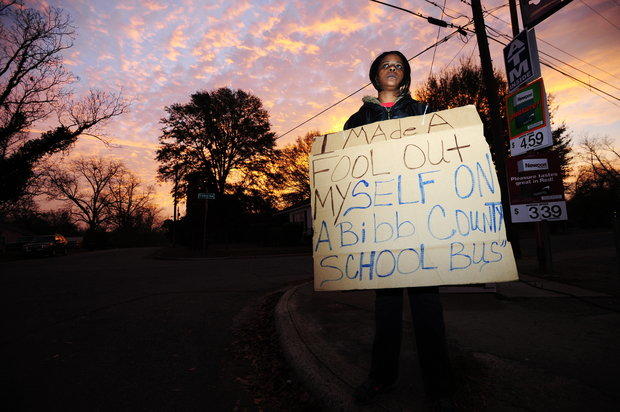
Section Branding
Header Content
Does Court-Ordered Shame Work?
Primary Content

38-year-old Natosha Freeman has spent each morning this week at a bus stop wearing a homemade sandwich board that reads: "I made a fool out [of] myself on a Bibb County School Bus."
Friday she will serve the last day of this unusual court-imposed sentence.
The mother of six pleaded guilty to charges stemming from an incident in April in which she boarded a school bus and had a physical altercation with her 11-year-old cousin, following a disagreement.
Based on comments Freeman made this week to the Telegraph of Macon, it's unclear if the punishment is having its intended affect.
"If I could have done it differently, the only thing that would have happened is I wouldn’t have gotten on that school bus," Freeman said. "She [the cousin] still would have gotten that whopping for telling me to kiss her ass."
So, how effective is punishing someone with court-ordered shame?
There's no hard data on this, but many legal observers will tell you that kind of alternative sentencing is on the rise. There is pressure from various quarters to keep low-level offenders out of jail. (See Governor Nathan Deal's Georgia drug court initiative that works to rehabilitate criminals outside prison walls.)
As for Freeman, she was given a choice between the proverbial scarlet sandwich board and four weekends in lockup.
Attorney Aaron S. Book, author of Shame on You: An Analysis of Modern Shame Punishment as an Alternative to Incarceration, said at least the shame punishment is cheaper.
"Particularly in this circumstance when she had to make her own sandwich board. The straightforward cost of the incarceration, and the administrative cost of putting somebody in and out of jail for three or four weekends, is going far out way the expense," Book said with a chuckle.
And, Book argues, a shame-based punishment is more likely to be noticed by others. But if it gets press, does it necessarily serve as an effective deterrent?
Data on that is also lacking, but deterrence is at the heart of so-called "truth in sentencing," a policy movement aimed at making sentences more predictable by rolling back things like parole.
Attorney and law blogger Oscar Michelen sees creative sentences (like the sandwich board) as being in violation of the "truth in sentencing" ethic; not because they’re light, he said, but because they’re capricious.
"So while I know of no research that shows that these shaming penalties don’t work, I do know that consistency in sentencing, one of the main reasons we went in that direction in modern criminal justice was because we found that inconsistent sentences did not lead to appropriate deterrence and punishment," Michelen said.
It is worth noting that Freeman's sentence was handed down by Bibb County Superior Court Judge Howard Simms, a man who very recently endured his own public shaming. According to a sheriff’s report, the judge failed a breathalyzer test at a roadblock in October. Deputies let him go, the media did not.
Tags: justice, Adam Ragusea, Howard Simms, Natosha Freeman, shame
